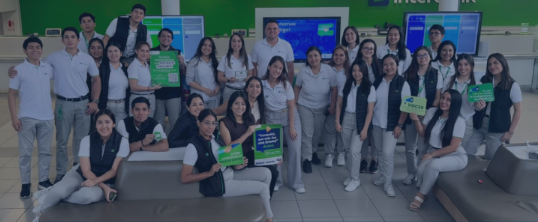Voices! Building Sexual Harassment Free Workspaces at Interbank
Start Reading

1. Company at a Glance
This case study will explore how Interbank, a leading financial institution in Peru, developed and implemented a comprehensive strategy to prevent sexual harassment in the workplace. By shifting from a reactive to a proactive approach, the company created a culture of zero tolerance, trust, and prevention—empowering employees, engaging leadership, and setting a new benchmark for workplace safety and dignity. Through this initiative, Interbank has strengthened employee well-being, fostered a safer work environment, and reinforced its reputation as a company committed to equity and inclusion.
Financial Sector
Industry
1897
Founded
Peru
Headquarter
+6,200
Number of Employees
2. The Challenge
Despite having protocols in place to address sexual harassment in the workplace (SHW), Interbank identified a critical gap between formal grievance mechanisms and the employee experience. While reported cases were low, this did not necessarily reflect an absence of incidents. Rather, it stemmed from fear, distrust, and lack of awareness among employees. Many employees were unsure which behaviors constituted SHW, how to report them, or what would happen after doing so. This culture of silence, reinforced by stigma and normalization of inappropriate conduct, revealed that a reactive approach was insufficient.
To effectively address SHW and promote a workplace rooted in dignity and safety, Interbank recognized the need to go beyond compliance—building trust, strengthening prevention, and creating a zero-tolerance culture that empowered every employee to act.
3. The Action
Interbank launched Voices Against Sexual Harassment in the Workplace, a comprehensive program designed to instill zero tolerance for SHW across the organization. Grounded in trust, prevention, and collective accountability, the initiative was structured around a 360° strategy with interconnected actions:
Diagnosing the Problem with Transparency and Depth
- A pattern analysis of complaints helped identify high-risk areas and behavioral trends
- The ELSA survey and employee listening sessions revealed knowledge gaps, normalized problematic behaviors, and distrust in reporting mechanisms
- Internal policies were reviewed and restructured to ensure accessibility and a stronger focus on employee well-being.
Strengthening the Institutional Framework
To reinforce accountability, Interbank developed a clear and robust internal structure:
- Policies and protocols that exceed legal compliance.
- Confidential and accessible reporting channels include a secure ethics line managed externally by KPMG and designated internal contact points. Using a third-party administrator like KPMG ensures anonymity, impartiality, broad accessibility, and reinforces trust. This channel is part of Interbank’s compliance program, with metrics supervised by the Chief Compliance Officer (CCO) and reported to the Board. Alternatively, employees can approach trained leaders or HR representatives, with all cases likewise reported to the CCO and the Board.
- Two specialized committees: an Intervention Committee for case management and a Resolution Committee composed of senior executives to ensure oversight and learning.
Establishing a Culture of Prevention
Prevention is at the heart of the Voices! strategy.
- Leadership engagement is mandatory, with leaders receiving specialized training and participating in forums and committees where SHW is regularly addressed.
- Agents Against SHW, 41 volunteer employees across locations, were trained as peer educators. They lead interactive, team-based activities—such as trivia, card games, and roleplays—tailored to topics like reporting flow, sexist behaviors, and sexual misconduct. This peer-led model reached over 2,000 employees and created safe spaces for dialogue.
- Inclusive onboarding embeds SHW prevention into early employee experiences, ensuring alignment with company values from day one. The training reinforces the company’s zero-tolerance culture by introducing employees to its policies, teaching them how to identify warning behaviors, and explaining the reporting process.
- Engaging its suppliers ensures that the initiative's impact is extended beyond Interbank’s four walls. Suppliers received tailored training, were invited to open events (such as those held on Peru’s National Day Against SHW), and offered tools to improve their own prevention strategies. The program is now expanding beyond the country’s capital to reach more regions.
Continuous Training and Visibility Across All Levels
Interbank ensures SHW prevention remains visible and dynamic.
- All employees complete annual SHW prevention training, updated yearly based on survey feedback.
- Specialized training for the Intervention Committee includes gender-sensitive case handling.
- Organization-wide campaigns—delivered through presentations, open talks, and supplier workshops—make messaging accessible and clear.
- In-person visits were held across branches, using engaging activities co-led by HR and team leaders.
- Communication materials are shared across 22 digital and physical touchpoints such as billboards and screens, ensuring reach across all roles and locations.
Human-Centered Case Management
Each report of sexual harassment is handled with care, confidentiality, and professionalism.
- The entire process—from the initial report to final resolution—is managed by an external expert, ensuring impartiality and trust. Only the designated internal committees (Intervention and Resolution) are involved in reviewing cases, maintaining strict confidentiality.
- Psychological support is offered throughout the process by an independent provider.
- All official reports are thoroughly investigated, and teams involved in incidents receive additional training to reinforce respectful behavior
Advocacy and External Engagement
- Affected individuals are invited to provide feedback after case closure. Previous responses have highlighted high levels of satisfaction with support received.
- Annual ELSA survey results inform strategy adjustments, keeping the program responsive and employee-centered.
4. Overcoming Barriers
Implementing a comprehensive SHW prevention strategy presented several challenges, which Interbank addressed with targeted solutions:
Cultural Silence and Fear of Retaliation
One of the greatest barriers was the employees’ reluctance to report due to fear, stigma, and distrust in the process.
Solution:
Interbank prioritized building trust through transparent communication, safe reporting channels, and human-centered case management. The introduction of Agents Against SHW—peer volunteers promoting awareness and dialogue—helped normalize conversations and break the silence.
Lack of Clarity on What Constitutes SHW
Many employees struggled to identify inappropriate behaviors or understand reporting procedures.
Solution
Mandatory training, simplified internal protocols, and omnichannel communication campaigns clarified expectations and behaviors, ensuring employees knew how to recognize and respond to SHW situations.
Decentralized Workforces and Communication Gaps
Reaching all employees across locations and roles posed logistical challenges.
Solution
The company launched a multichannel communication strategy—including face-to-face sessions, digital tools, and physical visibility points—to ensure consistent messaging and accessibility across the entire organization. The Agents Against SHW, who were chosen from different teams and provinces, also helped generate closeness and trust.
5. Impacts & Results
Reduction in Inappropriate Behavior and SHW Incidents
The prevalence of sexual harassment in the workplace dropped from 12% in 2023 to 8% in 2024, according to the ELSA survey.
Reports of inappropriate behavior fell significantly, from 12.3% to 3.6%, reflecting an internal culture shift.
The percentage of confirmed SHW cases relative to total reports decreased from 95% to 59%, indicating better understanding of what constitutes harassment.
Stronger Leadership and Case Management
Trust in leaders as reporting channels increased from 41% to 47%, showing growing confidence in leadership involvement
100% of formal complaints were fully investigated, ensuring procedural consistency and accountability.
Greater Trust and Empowerment
Employee trust in the company’s zero-tolerance policy increased from 89.9% to 90.7%, according to the annual internal ELSA survey. This trust is measured through employees’ perceptions of how effectively sexual harassment is prevented, investigated, and sanctioned in the workplace.
For the first time, male employees began to speak up, breaking long-standing stigmas around reporting.
The proportion of employees who feel confident setting boundaries and addressing inappropriate behavior rose from 18% to 33% according to the survey
Organizational Recognition and External Validation
94.3% of employees reported feeling that their workplace is free from harassment, discrimination, or violence, maintaining the previous year’s rating in the Great Place to Work survey
Interbank received recognition from ELSA as a top performer in SHW prevention, with a special mention for having the lowest tolerance for harassment in the country
84% rated Interbank as a psychologically and emotionally healthy place to work, a slight increase from 83.5% in 2023.
In the 2024 Great Place to Work Peru ranking, Interbank was named the #2 best company for women and #1 in diversity, equity, and inclusion.
6. Key Lessons Learned
Go Beyond Legal Compliance
While most companies in Peru limit their efforts to fulfilling Law No. 27942, Interbank demonstrated that a comprehensive, human-centered program is essential to create meaningful cultural change. Legal procedures must be adapted to prioritize employee well-being and empathy
Engage Senior Leadership in Decision-Making
Creating a Resolution Committee that includes senior executives—such as the VPs of Human Development, Legal Affairs, and the area involved—ensures that disciplinary decisions are made with strategic oversight and accountability. This reinforces the importance of the issue at the highest level.
Start Prevention from Onboarding
Starting SHW prevention from day one helps build trust and align new employees with company values. It reduces future resistance and helps new employees align with the company’s values from day one
Empower Employees Through Decentralized Awareness
The Agents Against SHW initiative allowed Interbank to break taboos and normalize conversations through peer-led activities. These agents became visible, trusted figures in their teams, surfacing cases that might not have otherwise reached formal channels.
Include External Stakeholders
Involving suppliers who interact with employees on a daily basis extends the impact of prevention efforts beyond organizational boundaries. It helps build a consistent, respectful environment across the entire value chain.
"A truly safe workplace is built on more than rules – it’s rooted in culture. Real progress begins when respect guides behavior and every voice is empowered to speak up. Tools from the UN Global Compact, such as the CoP, have supported us on this journey."
Zelma Acosta-Rubio, Chief Diversity & Inclusion Officer
7. Resources
Interbank, a UN Global Compact signatory since 2014, has committed to the Forward Faster Initiative's target of establishing a corporate financing strategy linked to SDG investments and performance, and reporting on the amount and proportion of such SDG finance.
Recommended UN Global Compact resources to support your journey:


